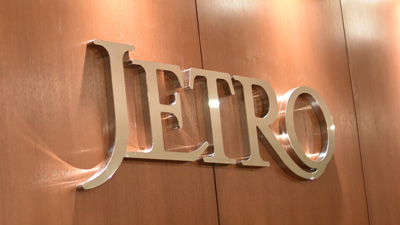Cactus Communications KK
When founded, Cactus Communications Pvt. Ltd. In India, started by providing support for the publication of academic papers on specialized and technical subjects through its translation and English proofreading services. The company established Cactus Communications KK in Tokyo in 2007 to address the needs of the same niche industry in Japan. Makoto Yuasa, Representative Director of the subsidiary, tells JETRO what brought the company to Japan and reveals its future plans.

Cactus Communications Pvt. Ltd. was founded in Mumbai, India in May 2002 to provide English proofreading and translation services mainly to the Japanese academic sector, including researchers and universities. Abhishek Goel, who co-founded the company, was visiting Japan through an exchange program as part of an international internship project. During his stay in Japan, he visited a professor in the Faculty of Engineering at the University of Tokyo, who asked him to proofread an essay written by the professor. This experience made Goel aware of the need of Japanese-to-English translation and English proofreading in Japan that specializes in academic papers.
English is the official national language in most states of India and is considered a bridge or trade language as well. There is no dearth of talent in India and a lot of premium is placed on academics and expertise. Goel’s experience in Japan convinced him that he could make use of India’s unique advantage –native proficiency in English and cost-effectiveness. For these reasons, he co-founded Cactus with his elder brother, Anurag Goel, who had been working as a business consultant. In 2007, they opened their Japanese subsidiary, Cactus Communications KK, in Tokyo. In addition to the headquarters in India, Cactus has bases in five other countries worldwide: Japan, Korea, China, Singapore, and the US. The company provides English proofreading and translation services specializing in academic papers and targets universities, research institutions and individual researchers who desire to publish scientific papers. Of the company’s some 650 employees worldwide, 90 percent are based in the headquarters in India.
The Japan office has employees engaged in customer service, sales, and marketing. At first, Cactus had in-house Indian native English-speakers responsible for all the English proofreading orders the company received. However, due to the growing needs from the academic sector for high-standard proofreading focused on highly professional and technical subjects, the company has recently started hiring freelance proofreaders worldwide with advanced academic degrees—such as master’s degrees or doctorates or certifications in the translation industry. The company assesses the subject matter of a customer’s paper and assigns—a translator with the most suitable knowledge on that subject.
Challenges in entering the Japanese market
Cactus prides itself on transacting with a wide range of customers, encompassing research institutions, companies and major national universities in Japan—such as the University of Tokyo and Kyoto University. However, Makoto Yuasa, Representative Director of the Japan subsidiary of Cactus Communications confesses, “When launching our business in India, we struggled hard to acquire customers in Japan.” Yuasa had been working at the headquarters in India as an intern through an exchange program from 2003 to 2005, just after Cactus was founded. At that time, Mr. Yuasa was trying to tele-market to professors at universities in Japan in order to acquire more customers. However, he didn’t experience much success because Cactus was not a known brand in Japan at that time, and he had great difficulty in obtaining new leads. Cactus, then, adopted search engine marketing and got an opportunity to grow exponentially. Yuasa focused on improving the company’s website by using the then-fledgling techniques of search engine optimization and listing advertising. His effort gradually started bearing fruit leading to a gradual increase in the number of customers. In addition to this, Cactus opened new channels by obtaining reliable partners, such as Kinokuniya Company Ltd., a bookstore that had close ties with universities. The company also worked on branding activities by holding seminars and workshops targeted at researchers of universities and research institutions. These activities helped build trust in Cactus, eventually allowing it to obtain a larger number of customers.
Overcoming cultural obstacles and creating a Japanese-style service
Thinking back to the time just after the Japanese subsidiary was opened, Yuasa recalls that he had many discussions with the staff at the headquarters in India about the business differences between Japan and India.
He asserts, “The main problem we faced just after we started our Japanese business was the difference in how time is perceived between Japanese and Indian cultures. In Japan, any delay in submitting work would damage the credibility of the company. On the other hand, in India, most people are tolerant of a delay of about 30 minutes. However, after many discussions, tweaks to the process, and resultant changes, the services at Cactus have now become more compatible with the Japanese work ethic—they strictly meet deadlines. If they are late, even by a minute, no service fees are charged to the customer.”
Cactus has evolved into a professional service provider thanks to the steady perseverance of Yuasa. Detailed feedback about the difference in business practices between Japan and India was provided. This resulted in a deeper understanding of the Japanese business culture. Even though the staff is required to adhere to strict Japanese rules, the company boasts of a low attrition rate. Yuasa explains, “This is because Cactus places high value on a flexible corporate atmosphere, respect for one another’s culture, and the willingness to try to understand each other.”

Cactus Communications KK published these books about English essays.
Work ethic in Japan
Doing business in Japan means facing a lot of challenges derived from cultural differences. However, one of the typical Japanese characteristics—being earnest— has helped Cactus expand its business in a big way.
Yuasa says, “The research conducted by Japanese scientists is at the highest levels in the academic sector worldwide. A good example of this is the research carried out by Dr. Yamanaka, a Nobel laureate. It fulfills me to provide support to a great number of researchers who are working hard on their studies out of a sincere desire to contribute to society. Providing high-quality services pleases customers, which contributes to building lasting relationships. There are also examples of positive feedback from our customers leading to new business.”
In addition to Japanese-to-English translation and English-proofreading which Cactus has been conducting, it has also developed a consulting service for international public relations and research promotion targeting universities, research institutions and academic societies. Cactus now provides a wide range of services that are helping Japanese researchers find their way in the world. These services include the creation of websites, the publication of brochures and the production of videos in English.
Contributing to a better society by supporting researchers
While the number of scientific papers published has been growing worldwide; particularly in the US, China and the UK; among major countries, only Japan has seen a drop continuously since the peak in 2000. Despite the slowdown, Cactus is enthusiastic about contributing to realizing a better society by providing support to researchers. To do so, the company attempts to identify their specific needs. Explaining the broad vision of the services, Yuasa said, “Not just as proofreaders but also as a company supporting the publication and promotion of spectacular research achievements, we want to provide added value to our customers. We have proudly provided support, been attentive to details and customized to the needs of each researcher striving to publicize their papers. We would now like to widen our business scope to help Japanese universities, research institutions and academic societies publicize their achievements. It is our job to ensure that such excellent research contributes to the society, and it is a job well worth doing.”
Support from JETRO
JETRO’s Invest Japan Business Support Center (IBSC) has temporary offices at its six locations in Japan—Tokyo, Yokohama, Osaka, Nagoya, Kobe and Fukuoka—which non-Japanese companies can use at no charge. Cactus was based at one of these offices in Tokyo twice, just before entering the Japanese market and while preparing to open the Japanese subsidiary.
Yuasa comments, “The temporary office is well-located and well-equipped with great business infrastructure. The consultation on taxation proceedings and employment was available in English, free of charge, which helped us a lot. Since we see Western Japan as a potential hub for research—with a fair number of universities and research institutions, such as Kyoto University and Doshisha University, as well as pharmaceutical manufacturers, we intend to develop our business there as well. When that time comes, we would like to use JETRO’s service again.”

Makoto Yuasa, Representative Director of the Japan subsidiary of Cactus Communications
(Interviewed August 2017)
Company history
- May 2002
-
Establishment of Cactus Communications Pvt. Ltd. in Mumbai, India
- July 2007
-
Establishment of Japanese subsidiary Cactus Communications KK in Tokyo
Cactus Communications KK
- Established in
-
July 2007
- Business Overview
-
Japanese-to-English translation and English proofreading of academic papers, tape transcription in English, support for publication of academic papers and support for the promotion of academic societies to the world
- Capital
-
20 million yen
- Parent company
-
Cactus Communications Pvt. Ltd.
- Address
-
TUG-I Building 4F, 2-4-1, Kandamisakicho, Chiyoda, Tokyo, 101-0061
- URL
-
- Corporate website
-
https://www.cactus.co.jp/

- Web services support for English proofreading, translation of academic papers, and support for academic papers submission
-
https://www.editage.jp/

JETRO’s support
- Lent temporary office space to Cactus on two occasions
Related Industry
Regional Information
Explore More
-

Success Stories
Success Stories are based on interviews conducted with foreign companies and foreign-affiliated companies that have successfully come into the Japanese market.
-

JETRO’s Support
We provide consistent one-stop service for establishing a base or expanding business in Japan.
-

Setting up Business
You can find information on overall and detailed steps, cost estimation, an overview of the laws, regulations and procedures related to setting up business, and more.
Contact Us
Investing in Japan
We will do our very best to support your business expansion into and within Japan. Please feel free to contact us via the form below for any inquiries.
Inquiry FormJETRO Worldwide
Our network covers over 50 countries worldwide. You can contact us at one of our local offices near you for consultation.
Worldwide Offices























